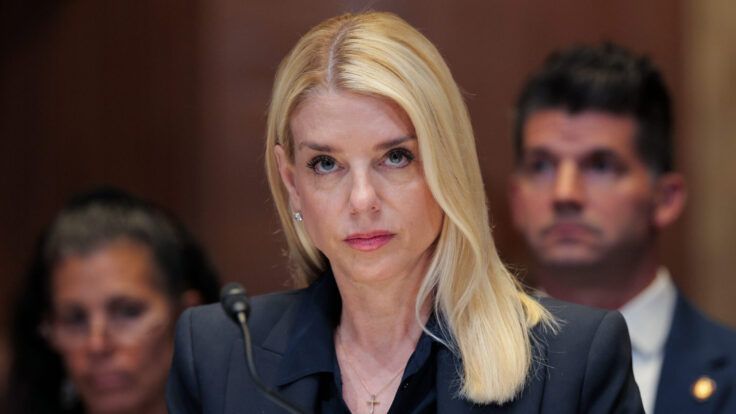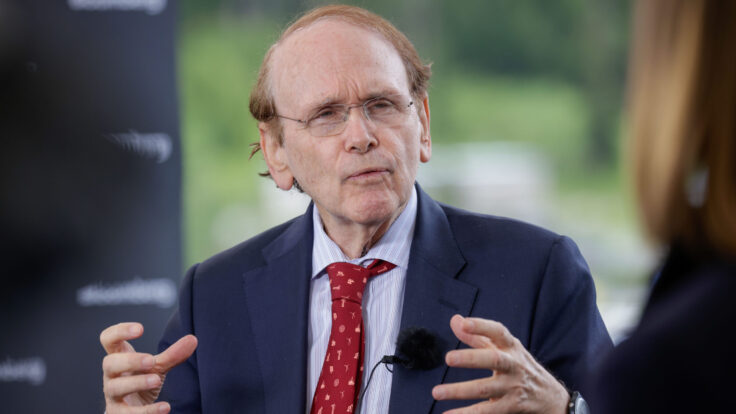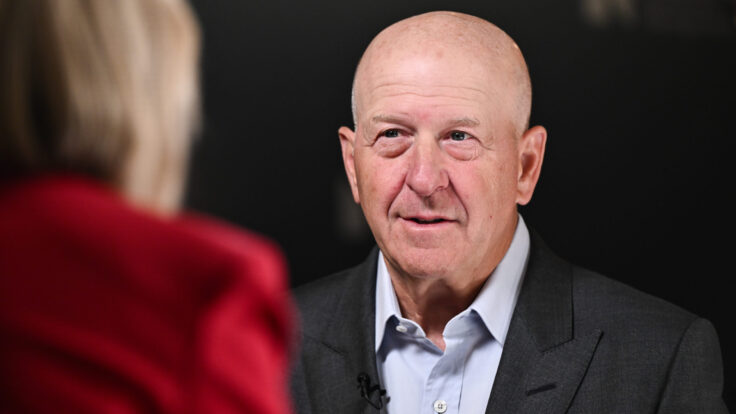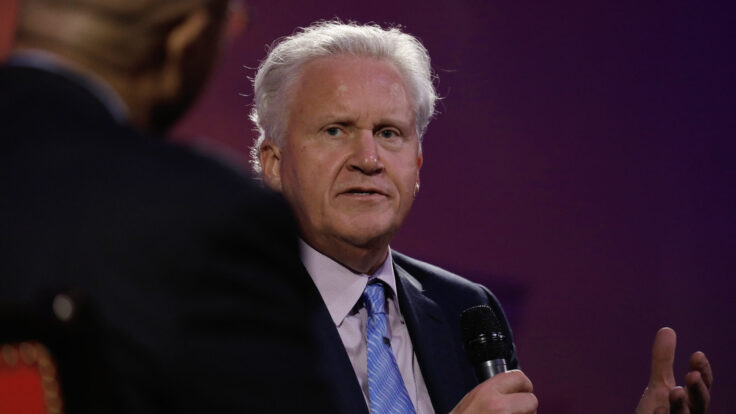 |
|
Happy Holidays, and welcome back to Dry Powder.
|
|
Long before Sam Bankman-Fried was duly deposited in a squalid Bahamian prison for a laundry list of alleged financial crimes, he was no less than the billionaire wünderkind-about-town, dazzling investors and political folks alike with a high-minded philosophical and philanthropic agenda. But there were, of course, a handful of moments, here and there, where his deceitfulness shone through.
This special issue of Dry Powder is the second in a mini-series recounting the stories of people who caught a whiff of something rotten before the empire came crashing down. In this installment, which takes place on the sideline of a fintech conference some 15 months ago, S.B.F. all but admits to former Wall Street broker-turned-television producer Laura Goldman that the customers of his now-collapsed crypto exchange, FTX, were essentially screwed if the company went south. And boy was he right.
Bill
|
|
|
| Some 11 minutes into a nearly hour-long conversation with Sam Bankman-Fried in September 2021, the former Wall Street broker-turned-television producer Laura Goldman finally got down to business. The two were chatting on the sidelines of Anthony Scaramucci’s 2021 SALT conference at the Javits Center, on September 13, after S.B.F. was on a panel alongside Kevin O’Leary, the Shark Tank star, Jeremy Allaire, the founder of Circle, and Anatoly Yakovenko, the founder of Solana. What, Goldman asked, was S.B.F. going to do to protect FTX’s customers if and when FTX, or its management team, did something “crazy” to cause their money to be lost, or something else equally unfathomable?
Goldman wasn’t trying to be needlessly provocative. Many people were concerned about crypto’s sketchy reputation. As a former broker, she wanted to know what protections S.B.F. had put in place for FTX’s customers in a market that had yet to be fully regulated by the various alphabet soup agencies that govern tradfi—S.I.P.C., F.D.I.C., insurance companies, etcetera. “Oh absolutely,” S.B.F. replied, “[crypto] has a bad reputation in a lot of places. It’s a great question.” He told Goldman that he and others in the crypto industry had to work closely with regulators to make things more transparent. He was concerned that “too frequently” regulators were threatening to “disrupt industry” when companies turned out to be “non-compliant.”
At first, S.B.F. told Goldman he was eager to find a solution to that conundrum in the gobbledygook corporate lexicon of Gen Z alt-assetese. “We want to have constructive conversations with regulators and what we want to say is, Look, what’s important to you guys? What are you guys attempting, especially when it comes to customer safety, and protecting customer funds, protecting customers’ information? What’s important, from your perspective? How can we work with you to make that happen? And we’re super happy to build out whatever tooling and transparency to make that happen.”
S.B.F.’s high-minded response is ironic for all the obvious reasons, in retrospect. Three months after his chat with Goldman, of course, he doubled-down on his soliloquy by taking the lead in testifying before Congress as part of regulatory hearings where he extolled crypto’s “public ledger” as a corrective to the opacity and self-dealing that fueled the 2008 financial crisis. Then, over the subsequent year, he would pour more than $40 million into political campaigns and associated lobbying efforts. It was his political gamesmanship, in part, that pissed off Changpeng “C.Z.” Zhao, his chief rival at Binance, and then set off a chain reaction that led to the collapse of FTX, its bankruptcy filing, S.B.F’s arrest for wire and securities fraud, and his extradition from the Bahamas to the United States, where he is out on a $250 million bond package while awaiting his guilty plea or a trial on the charges against him. His next court date is set for January 3. (S.B.F. has claimed he did not wittingly defraud investors, creditors, or consumers.)
To her credit, Goldman worried that trouble might be brewing at FTX and was sufficiently concerned about it to ask S.B.F. directly how he was going to protect FTX’s customers. Her questioning of S.B.F., some 15 months ago, has earned her a spot in my holiday mini-series about people who saw trouble at FTX and tried to do something about it. |
| Portrait of a Bullshit Artist as a Young Man |
|
| Back in her day as a broker, Goldman noted during their chat, the Securities Investors Protection Corporation (S.I.P.C.) provided protection up to $500,000 for losses in individual brokerage accounts, assuming cash or assets go missing. It was S.I.P.C., after all, under the stewardship of Stephen Harbeck, S.I.P.C.’s then C.E.O., who famously came to the rescue of some victims after the Madoff calamity. “What can you do?” Goldman persisted, according to the recording of their conversation that Goldman shared with me. “What are you doing now so that I know my money is going to be safe?”
S.B.F. replied by telling her what FTX was not doing. He was ostensibly miffed that there was no F.D.I.C. insurance, or anything similar, for FTX’s customers. “F.D.I.C. insurance, something which protects bank accounts, it doesn’t protect crypto exchanges,” S.B.F. replied. “And that would be something where I could imagine a future where that program gets extended to consumer accounts on crypto exchanges, right? That would make a lot of sense. Now, a lot of regulatory framework would have to be built up before we get there, before the Fed would feel comfortable doing that. But that would be a great goal, but it’s not there now.” (Yes, the ironies mount.)
Goldman persisted: Why not then lobby the insurance industry to provide some form of coverage to FTX customers who might be subject to fraud? His answer was, again, extremely revealing given recent events. “Some companies have tried to do that,” S.B.F. replied. “But here’s the problem you run into: They’re really kind of bespoke, non-standard set-ups. And who is the insurance company insuring? Are they insuring the company or the user? And to the extent that they are insuring it, what are they insuring it against? When you actually drill down into most of the deals that have been tried to be negotiated, they’re not going to fucking protect you. Like when you actually look at it, it’s like you’re protected unless one of these four things happen. And those four things are always the cause of loss. So there’s a lot of work that has to be done between industry and insurance companies coming up with what would be the right set of, like, what’s the right way to draft this that will actually protect the consumer there. Frankly, like, it’s weird how poor of a job has been done in that area, because that’s another obvious place to go: To insurance companies.”
He continued, with a comment that certainly would have stayed with any conversation partner: “And the answer is that part of the problem is that insurance companies don’t understand the technology that well. And so they’re sitting there being like, What if you like, messed up the code or I don’t know, something like that, like, we can’t evaluate your company. So we don’t know how much to charge you. So they end up writing out [a policy for] something like, unless you make some blockchain-based mistake. Well, that’s the whole point, right?”
If the insurance companies wouldn’t effectively play ball and there wasn’t any F.D.I.C. or S.I.P.C. for crypto customers, Goldman asked if FTX should create a fund to protect its customers, in effect self-insuring against a potential fraud. That was a good idea, too, S.B.F. replied! He said there were two sources of worry among customers. And in retrospect, his response is astounding. Here goes. “One source of worry is that the money’s just gone for some reason, right?” S.B.F. said. “Like it just gets hacked, right? Which is what they’re worried about. And that is something which is, you know, frankly, there aren’t great solutions for right now. But there should be and I think all the things you’re saying make sense.”
Goldman told S.B.F. that FTX should insure its customers against hacking, and reiterated that this was insurance that FTX could buy. “It’s insurance we can try to find to buy,” S.B.F. replied. |
|
|
| Goldman wasn’t totally put off by his evasions. She suggested that FTX could self-insure. “So we try and self-insure,” S.B.F. replied. “And we do do that. And so that gets to my second point…”
And the following is either quite a revelation that John J. Ray III, the new FTX C.E.O., should be pursuing, or just another S.B.F. lie: “We do have insurance funds and there’s hundreds of millions of dollars in them. We have hundreds of millions of dollars of assets in insurance funds. And, you know, we will insure our customers against any mess up of ours, up to the fullest ability we possibly can and frankly, it’s probably close to a billion dollars right now. Plus, I’m going to be honest, we would much rather have to sell equity to raise funds to cover something than to let any of our customers lose because of a mess up of ours.”
S.B.F elaborated that FTX had around $1 billion of assets in insurance funds but there were probably, as of September 2021, somewhere between $5 billion and $10 billion of customer assets, depending on market prices. “And so you can do partial self-insurance that way, and we do do that,” S.B.F. continued. Goldman returned to the idea that older people were worried about investing money in crypto. “They need to feel comfortable with their money in this system,” she said.
S.B.F. signaled that he agreed. “It’s a big thing,” he continued. “And the answer right now is that we’re insuring a lot of it but we can’t insure all of it.” He said FTX would need to raise $20 billion to be able to self-insure all of its customers’ assets and he was concerned that would be a lot of money sitting in a bank account earning no return, implying to Goldman that wasn’t going to happen. “But we can insure a large but partial loss,” he continued.
The conversation moved on to other crypto-related topics, and occasionally S.B.F. was interrupted by fawning fans from the SALT conference. Goldman asked S.B.F. how high he thought Bitcoin could go, especially since at the same conference that day, Wences Casares, a crypto entrepreneur and Bitcoin maximalist, predicted that Bitcoin might trade at more than $500,000 per coin. S.B.F. said he didn’t know and was not one to make predictions. “I’ve been wrong before,” he said. He was willing to say, though, that crypto was “a highly volatile industry” that had gone up a lot. “But it remains more volatile than most asset classes,” he continued. “And you can absolutely imagine scenarios where it goes down.” What could cause it to go down, Goldman wondered? And here S.B.F. might have been engaging in a little foreshadowing. “One thing is really, really bad interactions between regulators and companies in the industry,” he said. “There’s sort of all of these announcements which are generally not that big, but sometimes you see ones that are big, right? And there’s a big difference between clarifying or adding more regulation or going after the most non-compliant players versus trying to actually outlaw the industry as it is, right? And those are sort of, like, pretty different things.”
He said everyone in crypto was waiting to see how the U.S. ended up regulating the industry. He also noted that he had been in touch with the C.F.T.C. “which has been cracking down on unlicensed derivatives” and that he had been in touch with S.E.C. staff but not with Gary Gensler, the agency’s chairman. He said he was open to meeting with regulators, even if it meant going to Washington and putting on a suit and even if others in the industry were against him interacting with regulators. “This is something we’ve tried to emphasize as much as we can, which is, if there’s any regulators who want to talk to us, or have questions for us, like just reach out,” he said. “It’s easy to get a hold of us and I’m happy to be on the call. I’m happy to do it… I would be super happy to meet with them.” |
| “I’ve Never Dividended Money Out to Myself” |
|
| As it turned out, S.B.F. was all too happy to meet with politicians and ply them with millions. He told Goldman he had given away about $25 million to that point. “There are cases where I wish I gave more in retrospect,” he said.
Goldman took S.B.F. at face value when it came to his interest in pursuing regulation for the crypto industry. Figuring he really wanted the industry to be regulated, after the interview, Goldman introduced S.B.F. to the White House public engagement team. “He’s planning a Washington visit and would like to meet with people in the WH,” she wrote. Zach Butterworth, the White House Director of Private Sector Engagement, responded to Goldman that S.B.F.’s team should be in touch with Jana Plat, in the White House Office of Public Engagement.
They also spoke about S.B.F.’s wealth. He told Goldman that most of his net worth was illiquid and tied up in FTX. “Very close to 100 percent of my net worth is illiquid,” he said. He said he received a salary from FTX and had about $70,000 in a bank account. “I’ve never dividended money out to myself,” he told her. “…I don’t have hundreds of millions of dollars sitting in a bank account. For me, right now, it’s all in the company… It would be weird to be simultaneously raising money for the company to help operations and then also to be dividending it out.” Hmmm, that was a bizarre statement considering that’s allegedly exactly what he did.
They also spoke about where S.B.F. saw himself and FTX in five years. He said he hoped FTX would “grow market share” and become the “largest crypto exchange.” He said that he had been living in Hong Kong and would probably be moving. (He moved shortly thereafter to the Bahamas.) He explained that FTX was in the process of opening offices around the world and that FTX U.S. was based in Chicago and he would be spending time there setting up that office. “Frankly,” he concluded, “I mean, I’d love to live in the States. It’s where I grew up, and I think if you put aside everything else, if you put aside work and what would make sense for that, I think I would love to end up living back in the States.”
Be careful what you wish for, Sam. It looks like he’ll be spending plenty of time stateside, first at his parents’ home, in Palo Alto, where he’s under house arrest, thanks to his $250 million bond package, and then he’ll probably be spending decades in Butner, or its equivalent, either after he pleads guilty to the crimes he’s been accused of committing or when he’s found guilty of them, should he decide to plead not-guilty. Either way, it’s not looking good for S.B.F., especially since Caroline Ellison, his former paramour and the former C.E.O. of his hedge fund, Alameda Research, has pleaded guilty to fraud and other offenses and admitted that she conspired with others to steal billions of dollars of FTX customers’ funds. “I am truly sorry for what I did,” she told a New York federal judge, according to the unsealed transcript of her plea appearance in court. “I knew that it was wrong.” |
|
| FOUR STORIES WE’RE TALKING ABOUT |
 |
| The Townies, Pt. I |
| Matt and Lucas Shaw’s first annual Hollywood Townie Awards. |
| MATTHEW BELLONI |
|
 |
| Bezos’s NFL Dreams |
| Will the league let the man behind TNF also own one of the teams in the game? |
| TEDDY SCHLEIFER |
|
 |
| The Biden Dam |
| Unpacking the Scalise proposition and Biden’s intraparty challengers. |
| JON KELLY & TARA PALMERI |
|
 |
| 5 Streaming Predictions |
| After a turbulent twelve months, how will the streaming landscape shift in ’23? |
| JULIA ALEXANDER |
|
|
|
|
|
 |
|
|
|
Need help? Review our FAQs page or contact us for assistance. For brand partnerships, email ads@puck.news.
|
|
|
|
Puck is published by Heat Media LLC. 227 W 17th St New York, NY 10011.
|
|
|
|













